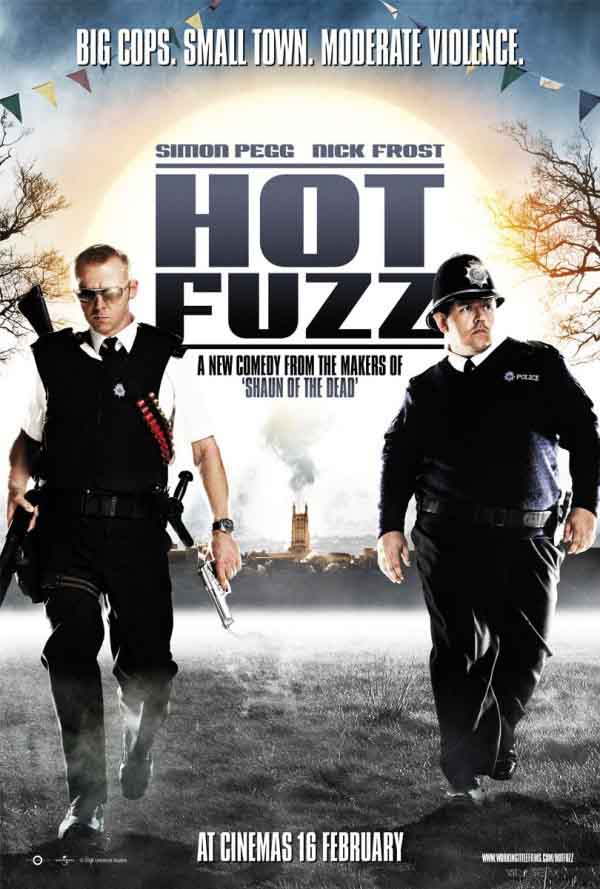In the grand tradition of send-ups like Naked Gun, Tropic Thunder and Tucker and Dale Versus Evil, this goofy UK film tears apart movie stereotypes and cliches while providing relatively harmless laughs. It bears no relation to reality and exists solely as distraction but serves an important role in revealing movie tropes for the empty and implausible scenarios they are.
As in most good films, it begins with hyperbole and descends into satire. A super-cop from the city moves to a small town where he finds that mysterious deaths are going unreported. He investigates and finds a dark secret to this idyllic and seemingly useless place. Because of his inner conviction that law and order is important, he takes on the bad guys with impossible odds against him. Since this is a family film, there are no major surprises in the plot, and the filmmakers focused on texture instead. Like most films of this genre, internal plot features are repeated in different contexts to achieve both continuity and contrast. Characters, while one-dimensional, also exist as people with relatively complex motivations formed from a balance of self-interest and goodwill. What initially seem like simply stereotypes expand to show the reasons behind the behavior, reducing the implied mindlessness of lifestyle choices. This allows the filmmakers to mutilate, spindle and destroy those roles and bring out the absurdity of our time.
Comedy cannot be bloodless. In this film, the prime targets are the vast hypocrisy of a society that, like the idyllic town in this film, has given up on finding reason for its actions. It operates on rote, driven by money and obedient to mindless rules, and these two behaviors get the most ire. Throughout the movie, classic movie moments are revisited and destroyed with mockery. Characters twist and erode their own character types of the type one might expect in a Hollywood blockbuster. Through it all, the film manages to make its characters likeable by showing them as relatively simple people working on simple rules that they have found generally guide them to the right places in a world that is chaotic and beyond control. While no surprises or great profundity come from Hot Fuzz, what makes it powerful is that in the process of satirizing a situation, and then movies themselves, it also mocks the absurdity of our current era and the uselessness of people within it. Like all good comedy, this approach results in well-needed laughs and increasing cynicism toward “the way things are always done around here.”
Tags: comedy, fish 'n chips, movie, tea, violence



Brett, do you like John Woo? (Sorta related, that’s the stuff that’s being sent up here.) Until he hit Hollywood his films were genuinely hessian, I think. He was basically doing a continuation of wuxia storytelling in a modern action movie context. Heroism and brutality. Not for wimps or liberals.
I think a review of saun of the dead should be next
Of this loose trilogy of films, “The World’s End” is my favorite. It shows the crushing alienation felt by the idealist in a world of sterile, self-consciously manicured consumerist perfection. For this individual, apotheosis can only come in the pursuit of a quest; the spiritual, intangible nature of this endeavor may be initially mocked, but its ultimate magnetism is undeniable.
The movie failed to posit an influence or motivation for the antagonist-entity. “Well, we should just get along, because, y’know?” was the extent of the argument against the heroes. Which made them look like the blockheaded knuckledragging rebels-without-a-cause type who are all into getting drunk and fucking shit up because you don’t want to be just another cog in the machine, so fight the system, right man? But what is the system? Something incomprehensible (or, worse, comprehensible but uninteresting) to the heroes.
Still a decently fun movie to watch but not really that pointed.
It’s not supposed to be. It’s a comedy. Any of the allegory you guys find here on society at large is just actually putting silly people in silly situations because buffoonery is funny. These guys are highly intelligent but just because we want to see a portrait of the failings of society in everything we watch doesn’t mean it’s there even if we draw blood from stones drawing parallels.
I’d point you toward one of the early scenes in Hot Fuzz where the supercop character is transferred to the country because his high performance made the rest of the staff look bad. Or the motivation of the “evil” forces (with whom I had a high degree of sympathy) to win what was basically yard-of-the-month awards.
But is that all grand scale satire or just there for easy laughs and character development?
I don’t think humor really works unless it hits something that is either denied or painful. But maybe.
I’m not complaining. We are both aware that the movie ought not to be criticized unduly for failing to portray what we want to see. Guess I wasn’t clear earlier but that’s all I mean to say.
I saw the brotherhood itself as the motivation. Scorning the mundane is in itself not as thrilling as the camaraderie of those who scorn it along with you. This will resonate with Hessians.
I see what you mean. Their brotherhood in the movie was directionless and destructive, though. Not to say that it shouldn’t be that way, just wanted to point out that the characters/writers do not extol noble virtues (again, not saying that they ought to).